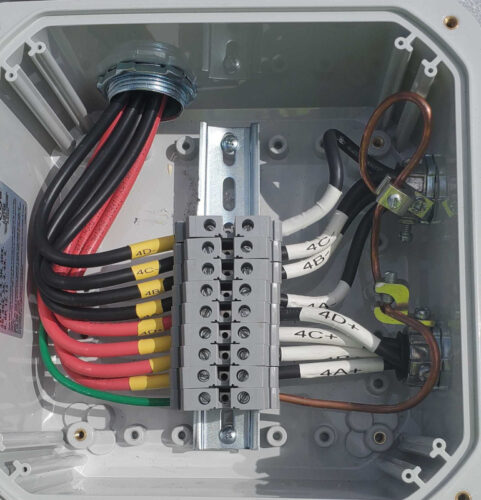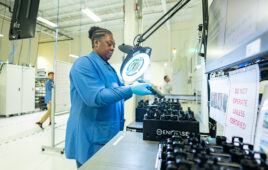As the solar industry continues to grow, more aging solar systems will inevitably require servicing. With each service call there is a cost to the customer, but also to the industry. Solar customers are often promised unparalleled reliability and 25-year warranties on their equipment. But what about labor? Many companies offer no service warranties, and the moment something fails, the customer has to pay out-of-pocket. Some companies offer a very low upfront system cost with lower-quality equipment, but this sacrifices long-term quality along the way. This can lead to unexpected system failures, lower customer satisfaction and a reduced return-on-investment.
Solar customers deserve peace of mind when they invest in a new system, and service warranties are one of the best ways to provide that assurance. This ensures the customer’s investment is safe and their system will perform for years to come. Solar companies, however, need to make sure that they are not overwhelmed with service calls, and that they can keep their truck rolls to a minimum. To make this happen, it is crucial to first install systems that are resilient and reliable. This not only protects the customer’s investment but also enhances the reputation of the solar company and the industry. Solar installation companies can reduce service truck rolls by focusing on quality system design, long-lasting components, high-quality installation and customer education.
The problem with truck rolls
Truck rolls, or service calls, are not just costly, but they also contribute to pollution, lead to a bad customer experience and waste precious administrative time. Reducing truck rolls is beneficial for the company, the environment and the customer. The cost of a truck roll is not just the direct expenses associated with the service call, such as labor and transportation costs, but also includes the indirect costs, such as lost productivity and potential damage to the company’s reputation. Therefore, minimizing truck rolls through preventive measures and efficient problem-solving can lead to significant savings and improved customer satisfaction.
The importance of good design
A quality solar system starts with good design. Solar systems need a solid foundation to perform properly. The design process is when a company can maximize production, eliminate unnecessarily complex elements and ensure the system is easy to service in the future. Ensuring proper string lengths, accurately modeling shading, reducing unnecessary junctions, limiting length of wire-runs, leaving space for servicing and reducing design complexity are all crucial aspects of a good solar system design. A well-designed system not only performs efficiently but also requires less maintenance, leading to fewer service calls and lower costs in the long run.
Long-lasting components
Inverter failures are the most common cause of serious system failures. It’s important to avoid low-quality electronics and have strong manufacturer’s warranties. Solar installers should avoid inverters, optimizers and rapid-shutdown devices that are unproven or have a poor track record. Choosing high-quality, durable components can significantly increase the lifespan of a solar system, reduce maintenance costs and improve system performance. Furthermore, using components with a strong manufacturer’s warranty can provide additional peace of mind to the customer and assure them that their investment is protected.
High-quality installation
Investing in training and certifications is crucial. A recent NREL study found that installation quality significantly impacts a system’s reliability. Having a well-trained team that can identify issues and correct them during installation is one of the most important ways to minimize service calls and liability.

Clear labeling and good cable management is a great way to increase safety and reduce time spent troubleshooting.
Installation professionals should ensure all cabling and wire terminations are properly secured, clearly labeled and protected. Ensuring that panels, racking and inverters are installed according to manufacturer specifications can limit issues down the road. Installers should confirm that the system as-built is the same as the original plans. Installers should also set up remote monitoring with a direct ethernet connection whenever possible. If an issue does occur, they’ll have good data to figure out what went wrong, and where. Good documentation of what was done during installation, including photos, conversations and any special considerations, can help catch problems early, or speed up the diagnostic process when they occur.
Customer education
Educating customers about their solar system can also help reduce service calls. Customer education improves their experience with the installation company and eliminates unnecessary inquiries about how systems work and unneeded truck rolls. Another benefit of customer education is they will be better informed if something does go wrong and more likely to identify it early. This means it can be fixed quickly, saving the homeowner costs and improving their overall experience.
Conclusion
In conclusion, reducing solar truck rolls and enhancing reliability in residential solar systems is not only crucial for customer satisfaction but also for the sustainability of the solar industry as a whole. By implementing service warranties, prioritizing quality system design, investing in long-lasting components, ensuring high-quality installations, and educating customers, solar companies can significantly minimize the need for service calls while providing peace of mind to their customers. Ultimately, this approach not only protects the customer’s investment but also strengthens the reputation of the company and the industry, paving the way for a more resilient and reliable solar future.
Matt Powers is the founder of Virtue Solar, a solar installation company in Charlottesville, Virginia. Matt is a Master Electrician with over 10 years of experience installing and managing solar operations. Matt is passionate about sustainability, outdoors, rock-climbing, local food and music, and wants you to have a great day.







Great article. Love hearing from industry pros!